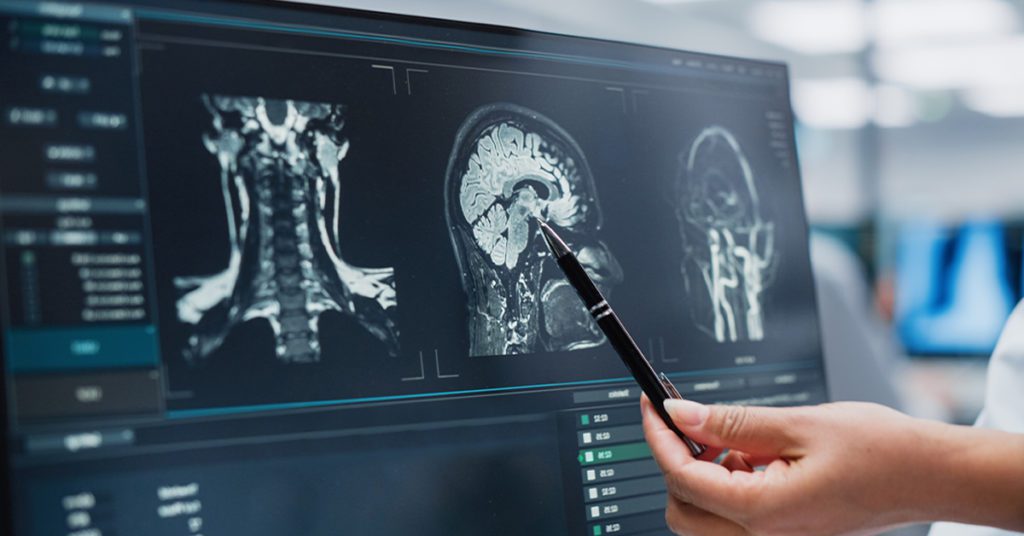Can a Brain MRI Help Diagnose Alzheimer’s Disease?
Understanding Alzheimer’s disease
Alzheimer’s disease is a progressive form of dementia that impacts memory and cognitive skills. Symptoms become severe enough over time that they disrupt a person’s ability to perform simple daily tasks. Alzheimer’s disease usually develops in people aged 65 or older, although younger people can be diagnosed with early-onset Alzheimer’s disease. Diagnostic tools like MRI imaging can help doctors identify Alzheimer’s disease earlier in the disease process.
Symptoms of Alzheimer’s disease include:
- Alterations in personality or mood
- Confusion about place and time
- Decreased problem-solving or planning ability
- Memory loss that causes difficulties in everyday living
- Impaired judgment
- Inability to complete familiar tasks
- Losing objects and being unable to retrace steps to locate them
- New problems using spoken or written language
- Pulling away from work and social activities
- Trouble with spatial awareness and image recognition
Talk to your doctor as soon as possible if you or a loved one shows signs of Alzheimer’s disease. No cure exists, but early treatment can help people preserve cognitive abilities longer.
What causes Alzheimer’s disease?
The human brain has 100 billion neurons, or nerve cells. These specialized cells use signals to communicate with different parts of the brain. When people have Alzheimer’s disease, neurons become damaged and eventually die, causing disruption in the communication process.
Scientists believe that abnormal proteins play a big role in the development of Alzheimer’s disease. The breakdown of amyloid precursor proteins in the brain leads to beta-amyloid proteins collecting and clumping together, forming plaques. Another protein called tau can group together to form tangles inside neurons. These plaques and tangles prevent cells from functioning properly.
Other changes in the brain linked to Alzheimer’s include chronic inflammation brought on by the buildup of waste and toxins in the brain, as well as vascular problems and brain shrinkage. Some parts of the brain shrink naturally with age, but the brain tissue of people with advanced Alzheimer’s disease shrinks significantly as neurons die.
Scientists are working to understand exactly why these changes occur and how to stop or reverse them, as well as how to detect them earlier. Imaging tests, including Alzheimer’s brain MRI along with NeuroQuant technology, are helpful tools in the diagnosis of Alzheimer’s disease.
Touchstone Medical Imaging offers high-quality MRI imaging at 40% to 60% less than the cost of hospital imaging. After getting a doctor’s order, make an appointment at one of our many convenient centers.
How do doctors diagnose Alzheimer’s disease?
Doctors must perform a few exams and tests to determine whether a person has Alzheimer’s disease. These may include:
- Cognitive tests to assess memory, problem solving ability and language skills
- Mental health evaluation
- Lab tests to rule out other causes of symptoms
- Imaging tests, including MRI and PET/CT scans
An MRI can show brain abnormalities in people with mild cognitive impairment, which can lead to Alzheimer’s disease. MRI scans help doctors diagnose or rule out other conditions that cause cognitive problems as well, such as concussion. However, sometimes a brain MRI looks normal during early stages of the disease. That’s why other tests are needed to determine an accurate diagnosis. Touchstone Medical Imaging also offers NeuroQuant technology, designed to pair with MRI to give more detailed information on brain volume abnormalities and to track brain volume over time.
Doctors may also order Alzheimer’s CT or Alzheimer’s PET/CT scans, which give valuable information on the anatomy and function of the brain. This type of imaging can help a doctor determine whether a person has Alzheimer’s disease or another form of dementia. Accurate information obtained through medical imaging enables doctors to recommend more effective treatments to slow disease progression.
Touchstone Medical Imaging’s board-certified, subspecialized radiologists read advanced imaging studies to provide doctors with precise results and the diagnostic insights for your treatment plan. If your doctor has ordered an MRI or other imaging to help diagnose Alzheimer’s disease, make an appointment at a Touchstone Medical Imaging Center near you.

